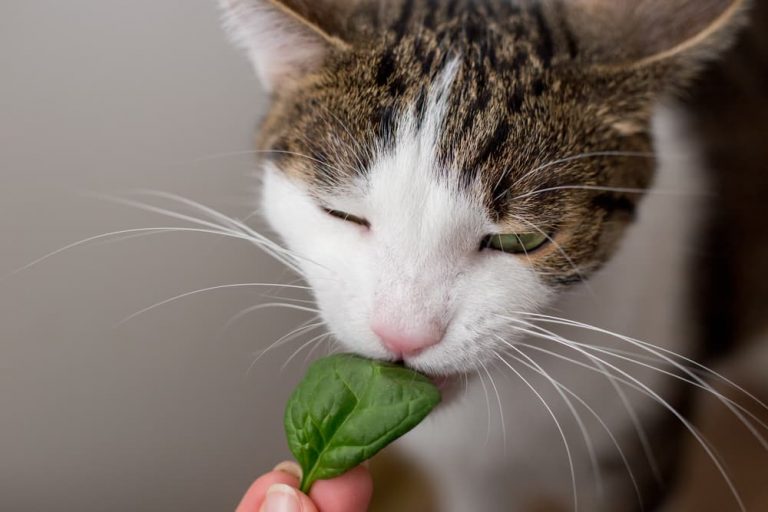Can Cats Eat Spinach?

Most of us strive to get more leafy greens into our diets because of their known health benefits. Spinach is one of the most widely consumed leafy greens and it’s no wonder why. After all, it was spinach that gave Popeye his superhuman strength!
For humans, spinach is touted as a superfood and is known to have anti-cancer, anti-inflammatory, anti-obesity and triglycerides-lowering properties [1].
Since spinach is so beneficial to humans you may be wondering: can cats eat spinach? This article will let you know if you should be feeding your cat spinach, how you should prepare spinach for cats, the health benefits and possible risks of feeding cats spinach.
Can Cats Eat Spinach?

In general, cats can eat spinach. Spinach is non-toxic to cats and can be enjoyed by most felines without any issues. Cats are obligate carnivores, meaning that their diet must contain animal products in order to provide all of their essential nutrients. However, you can supplement your cat’s diet with certain fruits and vegetables. In fact, just as fruits and vegetables are beneficial to human diets, they can be beneficial when added to your cat’s diet in small quantities.
At this time, there are no known studies that have specifically researched feeding spinach to cats but one study in geriatric cats did show that diets supplemented with added fruits and vegetables increased the cats’ lean body mass and improved their kidney function [2].
Can Cats Eat Cooked Spinach?

Cats can eat small amounts of cooked spinach. The biggest concern that veterinarians have with feeding cats spinach is that spinach is high in oxalates, compounds that, when consumed in high amounts, may increase the risk of kidney or bladder stones. Based on studies, cooking spinach has been shown to decrease the amount of oxalates present, thereby decreasing the potential risk of feeding spinach [3].
When cooking spinach for cats, it is best to steam or gently saute this vegetable without adding oils, salt or spices. Boiling is not generally recommended because it decreases many of the beneficial nutrients in spinach.
Can Cats Eat Raw Spinach?

Raw spinach is also okay to feed cats in moderation. Feeding raw spinach to cats will ensure that the spinach retains the highest amounts of many vitamins. However, raw spinach does contain high amounts of oxalates and should not be fed to cats with a history of urinary tract stones or abnormal urinary symptoms.
Is Spinach Good For Cats?

Spinach is chock full of beneficial vitamins, minerals and other health-producing compounds. It is rich in vitamins A, B6 and K, fiber, magnesium, manganese, potassium, folic acid, iron and calcium [4]. These nutrients are essential for different cellular functions throughout our own bodies and our cats’ bodies.
Listed are benefits of some of the nutrients found in spinach [5]:
- Vitamin A: Crucial for vision, growth and immune function.
- Vitamins B6: Important for red blood cell function, immune response and nervous system function.
- Vitamin K: Allows for normal blood clotting.
- Manganese: Supports the nervous system and bone development.
- Fiber: The fiber in spinach can help to promote your cat’s healthy digestion and fiber-enhanced diets are often recommended for pets that need to lose weight.
- Iron: Supports oxygen transportation throughout the body.
- Calcium: Crucial for healthy bones and teeth, muscle contractions and nerve impulse conduction.
Spinach is not a very common ingredient in commercial cat foods but can be found in certain varieties of Hill’s, Purina, and Fancy Feast brands of wet or canned cat foods.
Is Spinach Bad for Cats?

Spinach is not bad for cats and it can be a healthy treat or addition to your cat’s diet. However, as with most things, moderation is key. Any treats or foods that you feed your cat in addition to her regular cat food should make up no more than 10 percent of her daily calorie intake. Feeding a higher proportion will unbalance the diet and can lead to nutritional deficiencies and excesses.
Most cats need to eat around 200 calories per day, which means that no more than 20 of their daily calories should come from extra foods. The good news is that spinach is very low in calories, with one raw spinach leaf containing only about 2 calories [6]. For this reason, it would be hard to give a cat too much spinach.
For cats with a history of kidney stones, bladder stones, or any history of abnormal urinary symptoms, it is generally recommended to avoid feeding spinach, as this may increase the risk of calcium oxalate stones. However, one small study showed that feeding cats a diet containing high amounts of oxalates did not increase their urinary excretion of these compounds [7]. It instead showed that feeding high levels of low quality proteins increased urinary oxalate levels.
In general it is best to discuss whether or not you should feed your cat spinach, or any non-standard foods, with your veterinarian.
Spinach for Cats: The Verdict

In summary, spinach is a super healthy and nutritious vegetable. When fed in small quantities to a healthy adult cat, spinach can be beneficial to your cat’s health and may serve as a nutritionally dense low-calorie treat.
Avoid feeding spinach to cats with urinary issues or cats with other medical concerns without first speaking to your veterinarian.









